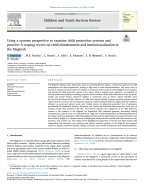You are here
Using a systems perspective to examine child protection systems and practice: A scoping review on child abandonment and institutionalisation in the Maghreb
The Maghreb (Algeria, Libya, Mauritania, Morocco (including Western Sahara), Tunisia) has high rates of child maltreatment and child abandonment, leading to high rates of child institutionalisation. This review aims to provide an estimate of the prevalence of children in institutions in the countries of the Maghreb and to compare and contrast the child protection systems in the region. Using a scoping review approach, we identified 44 relevant studies from databases including Academic Search Premiere, Africa-Wide Information, Policy file Index, Google, and Google Scholar. Estimated children in institutions were as follows: Algeria 550,000, Libya 80–145,000, Mauritania 45,850, Morocco 471,006, and Tunisia 140,000. Common elements included limited child protection resources, lack of transparent databases, limited separation between religion and state, Shariah’s influence on social and cultural norms, and a kafala system, an Islamically prescribed from of permanent guardianship for abandoned children. Mauritania and Tunisia had dedicated child protection codes, and all countries except Libya reported to the CRC. The literature indicates that components of the child protection systems in the countries of the Maghreb are fragmented with competing purposes, prioritising existing communitarian cultural mores over child protection. High rates of child abandonment and institutionalisation in the region result from inadequate child safeguarding structures and the stigmatisation of unmarried mothers and their children. Kafala, is a common element of Maghrebian child protection systems, with little alternative care provision, such as foster care. The scoping review highlights the opportunity to develop and adapt existing child safeguarding and alternative care structures and practice between countries of the Maghreb. Intra-regional research is urgently needed to facilitate changes and reduce rates of child abandonment and institutionalisation.

